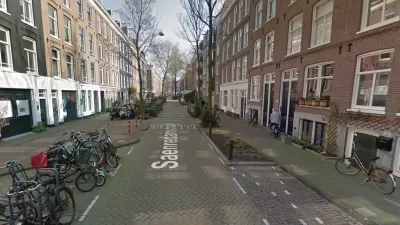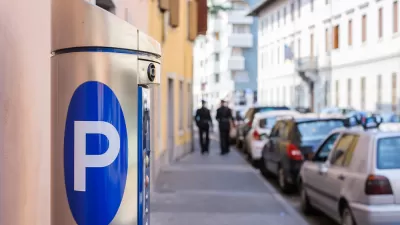Audi and Somerville will begin testing self-parking cars in 2018. Imagine the possibilities.
Tod Newcombe reports on the latest innovation in parking technology—cars that park themselves. The concept already has a test-bed in Massachusetts.
"The city of Somerville, Mass., and Audi, the German carmaker, have signed an agreement to not only create self-driving cars that park themselves but also build the infrastructure that such a technology would require (and allow). It could save the city as much as $100 million, according to Audi."
Newcombe describes the benefit of self-driving cars to parking three-fold: one, self-driving cars require less room to park, and thus can more cars can be shoe-horned into smaller spaces. "Second, parking garages would no longer have to be located downtown -- drivers and their passengers could exit the vehicles in the city and the cars would self-drive to the garages on the downtown’s periphery." And finally, all of the space and street capacity freed up by self-driving cars could then be used for bikes, pedestrians, transit, and real estate development.
More on how the Audi test will work in Somerville:
"The self-parking project, set to begin testing in 2018, will take place in an area known as Assembly Row, a former industrial district that the city hopes to transform into residences, offices, retail space, leisure amenities and a hotel. Currently, around 40 percent of the area within the Assembly Row project is dedicated to parking spaces. A garage that allows cars to self-park could save 26 percent of parking spaces for other uses, according to Audi, which calculates that each space is worth $25,000, or approximately $100 million in total savings by the time the project is completed in 2030."
FULL STORY: Can Cars That Park Themselves Reduce Traffic? Somerville, Mass., Will Find Out.

Alabama: Trump Terminates Settlements for Black Communities Harmed By Raw Sewage
Trump deemed the landmark civil rights agreement “illegal DEI and environmental justice policy.”

Planetizen Federal Action Tracker
A weekly monitor of how Trump’s orders and actions are impacting planners and planning in America.

How Atlanta Built 7,000 Housing Units in 3 Years
The city’s comprehensive, neighborhood-focused housing strategy focuses on identifying properties and land that can be repurposed for housing and encouraging development in underserved neighborhoods.

In Both Crashes and Crime, Public Transportation is Far Safer than Driving
Contrary to popular assumptions, public transportation has far lower crash and crime rates than automobile travel. For safer communities, improve and encourage transit travel.

Report: Zoning Reforms Should Complement Nashville’s Ambitious Transit Plan
Without reform, restrictive zoning codes will limit the impact of the city’s planned transit expansion and could exclude some of the residents who depend on transit the most.

Judge Orders Release of Frozen IRA, IIJA Funding
The decision is a victory for environmental groups who charged that freezing funds for critical infrastructure and disaster response programs caused “real and irreparable harm” to communities.
Urban Design for Planners 1: Software Tools
This six-course series explores essential urban design concepts using open source software and equips planners with the tools they need to participate fully in the urban design process.
Planning for Universal Design
Learn the tools for implementing Universal Design in planning regulations.
Jessamine County Fiscal Court
Caltrans
Institute for Housing and Urban Development Studies (IHS)
City of Grandview
Harvard GSD Executive Education
Toledo-Lucas County Plan Commissions
Salt Lake City
NYU Wagner Graduate School of Public Service





























